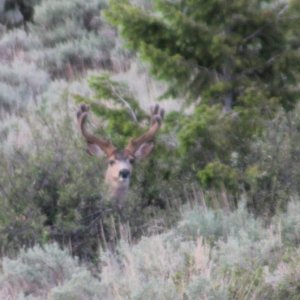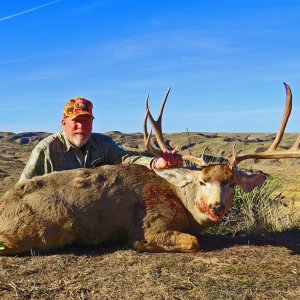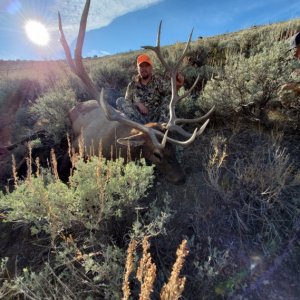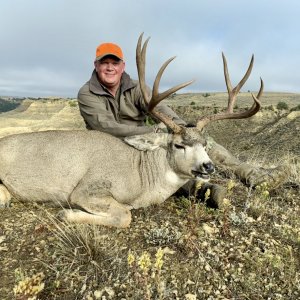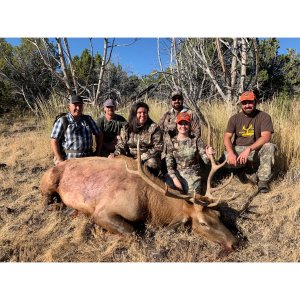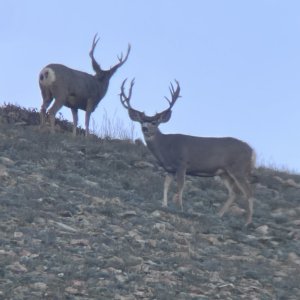2lumpy
Long Time Member
- Messages
- 8,481
LAST EDITED ON Nov-23-13 AT 11:08PM (MST)[p]Both of you most likely know but others may not .......
This issue of auction tags in Utah.
A perspective, regarding Utah only: I have absolutely no knowledge as to why other States operate the way they do, except to say, each State is different, very different, in it's ideology, demographics, geography, climate, social, industrial, economical, and political atmosphere. Therefore, comparing and contrasting one to another is generally a blind alley. Borrowing bits and pieces can be productive and there are examples of successes from using another State's methods of management but bits and pieces is generally all that ever fits one State and then another.
While it is always changing, this is Utah and more or less it has been for the last 30 years or so.
Utah is a relatively poor State at 41 out of 50 States in per capita income.
Utah has a Republican super-majority of 61-14 State Legislators and 24-5 Republican Senators.
Utah Republican Party believes (generally) that citizens who use State services should pay for those services and people that don't use those services should not be asked to pay for them. So.....if you want a golf course or a swimming pool or a new school, those that golf or swim or have children in school should pay for the facility, an those that don't, shouldn't have to pay for something they don't need or want. Of course, there is no way to perfectly execute the concept but basically it means, if you golf, swim or send kids to a local school, you are going to pay for it and the Legislature isn't going to raise taxes in Salt Lake City to pay for stuff the the citizens in St. George want or need. In a more simplistic statement, Utah tries to operate on a "pay to play fee" system. (I'm not saying this is the best or the worst way to run a rail road but it's generally how Utah operates government services.)
Utah's Division of Wildlife Resources, is a State agency (same as other States, of course) but does not get the major portion of it's budget from the State Legislature, it gets it from the sale of hunting and fishing license and other related fees associated with hunting and fishing, along with Federal matching funds also dependent on the number of fishing and hunting licenses sold (same as other States).
In Utah, when inflation or operation cost increase, the Legislature will, on occasion, provide one time funding and on occasion add a few million to the DWR's State funding allocation but the majority (the largest portion) of the increase is generated by increasing the price the agency charges for hunting and fishing licenses. Raising the "cost to play" so to speak.
In as much as the citizens in the State are in the bottom 20% of the country when it comes to income per person, every time there is an effort to increase license and other related prices there is public protect and complaints that the average family can't afford the increase. (there is always the argument whether the increase is justified, or if it's fair, or if it's necessary etc.)
Some years ago, (I haven't researched when it first started) someone, who knows who actually had the idea first but, I can tell you fingers will point to a dozen different people but, no single individual had the authority do decide on their own to: "offer hunting tags for sale to the highest bidder" in order to add funds to the DWR's budget. It had to be approved by the Utah Wildlife Board or the previous Board of Big Game. (It may have needed to be approved in concept by a Legislative vote. Again, I have not done the research because this started many, many years ago.) The belief was wildlife resources should pay it's own way and if additional funds were necessary and a few individuals were willing to give tens of thousands of dollars for a big game tag, and that would save the other "players" an increase in the "cost to play", everybody wins. The DWR got it needed funds, the cost of hunting/fishing licenses stayed lower than it would otherwise need to be, and the person that spent the $20,000 for the tag got what he wanted. It seemed to make sense, so they did it.
Because there were very little (there was some resistance to the concept early on, by different individuals and groups) objections at the beginning, from the public, the hunters, the non-hunters, the Legislature and the DWR (back then and still today) the concept took on a larger roll in Utah's state wildlife management because it seemed to be working so well. Most of the decision makers believed it was a small sacrifice with a lot of benefits tied to it, to the degree that it has now become a significant percentage of the funding the Utah DWR depends on each year.
Some may believe that it as gone too far and too many tags have been offered, others argue that the benefits still out way the sacrifice, others believe it's the principle and it's a flawed concept in every way, to the point of being harmful and immoral.
Presently, as far as I know, there is "no one" with enough power or desire (individually or as a group) in Utah that has any intention of moving away from the concept. Those in charge of these decisions have stated "repeatedly", "they like the way we are generating funds" to operate the DWR in Utah. It is presently, under the current ideology, demographics, geography, climate, social, industrial, economical, and political atmosphere, in Utah, not going to change significantly because those in control, from the Governor, the Legislature, the Wildlife Board (all past and present) believe it is the best way to do business. There are surely some in these bodies of governance that disagree but at present they are in minority.
Now, looking at this from outside Utah, or from a different ideology, a different political perspective, etc. you may or may not like it, or you might love it. But it's how it is here and I don't believe it going to change anytime soon, at least not in any significant way. So, we can live with it, work to change it, or be indifferent.
This might help in some way to at least understand how and why we got where we are in Utah today.
DC
This issue of auction tags in Utah.
A perspective, regarding Utah only: I have absolutely no knowledge as to why other States operate the way they do, except to say, each State is different, very different, in it's ideology, demographics, geography, climate, social, industrial, economical, and political atmosphere. Therefore, comparing and contrasting one to another is generally a blind alley. Borrowing bits and pieces can be productive and there are examples of successes from using another State's methods of management but bits and pieces is generally all that ever fits one State and then another.
While it is always changing, this is Utah and more or less it has been for the last 30 years or so.
Utah is a relatively poor State at 41 out of 50 States in per capita income.
Utah has a Republican super-majority of 61-14 State Legislators and 24-5 Republican Senators.
Utah Republican Party believes (generally) that citizens who use State services should pay for those services and people that don't use those services should not be asked to pay for them. So.....if you want a golf course or a swimming pool or a new school, those that golf or swim or have children in school should pay for the facility, an those that don't, shouldn't have to pay for something they don't need or want. Of course, there is no way to perfectly execute the concept but basically it means, if you golf, swim or send kids to a local school, you are going to pay for it and the Legislature isn't going to raise taxes in Salt Lake City to pay for stuff the the citizens in St. George want or need. In a more simplistic statement, Utah tries to operate on a "pay to play fee" system. (I'm not saying this is the best or the worst way to run a rail road but it's generally how Utah operates government services.)
Utah's Division of Wildlife Resources, is a State agency (same as other States, of course) but does not get the major portion of it's budget from the State Legislature, it gets it from the sale of hunting and fishing license and other related fees associated with hunting and fishing, along with Federal matching funds also dependent on the number of fishing and hunting licenses sold (same as other States).
In Utah, when inflation or operation cost increase, the Legislature will, on occasion, provide one time funding and on occasion add a few million to the DWR's State funding allocation but the majority (the largest portion) of the increase is generated by increasing the price the agency charges for hunting and fishing licenses. Raising the "cost to play" so to speak.
In as much as the citizens in the State are in the bottom 20% of the country when it comes to income per person, every time there is an effort to increase license and other related prices there is public protect and complaints that the average family can't afford the increase. (there is always the argument whether the increase is justified, or if it's fair, or if it's necessary etc.)
Some years ago, (I haven't researched when it first started) someone, who knows who actually had the idea first but, I can tell you fingers will point to a dozen different people but, no single individual had the authority do decide on their own to: "offer hunting tags for sale to the highest bidder" in order to add funds to the DWR's budget. It had to be approved by the Utah Wildlife Board or the previous Board of Big Game. (It may have needed to be approved in concept by a Legislative vote. Again, I have not done the research because this started many, many years ago.) The belief was wildlife resources should pay it's own way and if additional funds were necessary and a few individuals were willing to give tens of thousands of dollars for a big game tag, and that would save the other "players" an increase in the "cost to play", everybody wins. The DWR got it needed funds, the cost of hunting/fishing licenses stayed lower than it would otherwise need to be, and the person that spent the $20,000 for the tag got what he wanted. It seemed to make sense, so they did it.
Because there were very little (there was some resistance to the concept early on, by different individuals and groups) objections at the beginning, from the public, the hunters, the non-hunters, the Legislature and the DWR (back then and still today) the concept took on a larger roll in Utah's state wildlife management because it seemed to be working so well. Most of the decision makers believed it was a small sacrifice with a lot of benefits tied to it, to the degree that it has now become a significant percentage of the funding the Utah DWR depends on each year.
Some may believe that it as gone too far and too many tags have been offered, others argue that the benefits still out way the sacrifice, others believe it's the principle and it's a flawed concept in every way, to the point of being harmful and immoral.
Presently, as far as I know, there is "no one" with enough power or desire (individually or as a group) in Utah that has any intention of moving away from the concept. Those in charge of these decisions have stated "repeatedly", "they like the way we are generating funds" to operate the DWR in Utah. It is presently, under the current ideology, demographics, geography, climate, social, industrial, economical, and political atmosphere, in Utah, not going to change significantly because those in control, from the Governor, the Legislature, the Wildlife Board (all past and present) believe it is the best way to do business. There are surely some in these bodies of governance that disagree but at present they are in minority.
Now, looking at this from outside Utah, or from a different ideology, a different political perspective, etc. you may or may not like it, or you might love it. But it's how it is here and I don't believe it going to change anytime soon, at least not in any significant way. So, we can live with it, work to change it, or be indifferent.
This might help in some way to at least understand how and why we got where we are in Utah today.
DC

